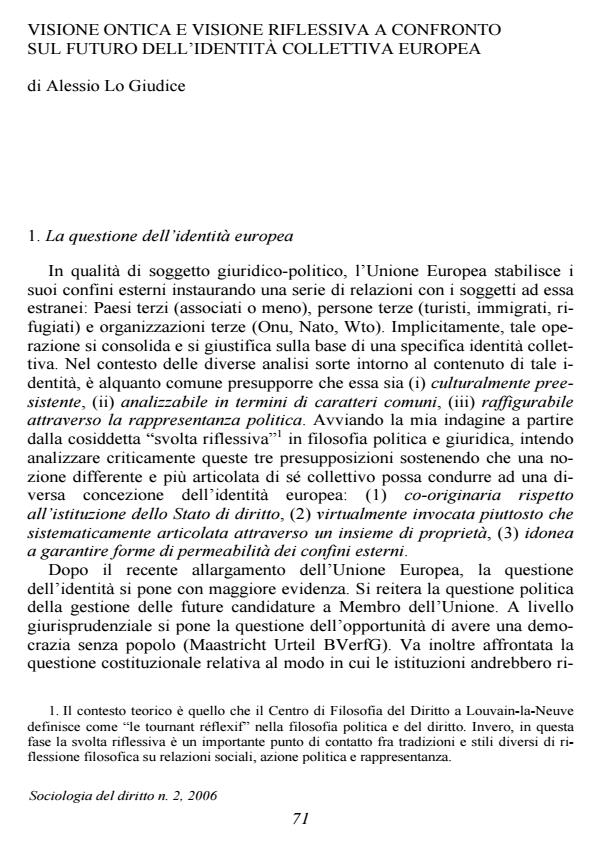Visione ontica e visione riflessiva a confronto sul futuro dell'identità collettiva europea
Titolo Rivista SOCIOLOGIA DEL DIRITTO
Autori/Curatori Alessio Lo giudice
Anno di pubblicazione 2006 Fascicolo 2006/2
Lingua Italiano Numero pagine 28 P. Dimensione file 117 KB
DOI
Il DOI è il codice a barre della proprietà intellettuale: per saperne di più
clicca qui
Qui sotto puoi vedere in anteprima la prima pagina di questo articolo.
Se questo articolo ti interessa, lo puoi acquistare (e scaricare in formato pdf) seguendo le facili indicazioni per acquistare il download credit. Acquista Download Credits per scaricare questo Articolo in formato PDF

FrancoAngeli è membro della Publishers International Linking Association, Inc (PILA)associazione indipendente e non profit per facilitare (attraverso i servizi tecnologici implementati da CrossRef.org) l’accesso degli studiosi ai contenuti digitali nelle pubblicazioni professionali e scientifiche
Embarking on this investigation from the reflexive change in political and legal philosophy, this article makes a critical analysis of the presumptions typical of a classical conception of collective identity as one that is culturally pre-existing, can be analysed in terms of common characters and can be illustrated in terms of political representation. The article argues that a different, more articulate notion of collective subjectivity could lead to a different conception of the European identity that would share its origins with the institution of the state governed by the rule of law, be invoked virtually rather than articulated systematically through a system of property and be suitable for guaranteeing forms of permeability of its external borders. The article then proceeds to make a critical analysis of the ontic notion of the collective ego, which can be explained with reference to an interpretation of identity based on presumed substantial shared elements, such as language, traditions, lifestyles and the political lexicon. At the same time, it highlights this vision’s contemporary dissemination. Subsequently, the article develops further on certain important approaches based on a notion of the collective ego, as opposed to the ontic one, before indicating reflexivity as the most suitable approach for discussing an idea of collective identity that keeps in step with the structural characteristics of the European Union. The hypothesis that is proposed for investigation is that the collective identity is essentially reflexive. In other words, it is generated by a process that does not allow the identity to be articulated systematically in terms of property, but that nevertheless enables it to be analysed in terms of the permanent redefinition of the parameters of political involvement, such as the parameters of inclusion and exclusion of foreigners.
Alessio Lo giudice, Visione ontica e visione riflessiva a confronto sul futuro dell'identità collettiva europea in "SOCIOLOGIA DEL DIRITTO " 2/2006, pp , DOI: